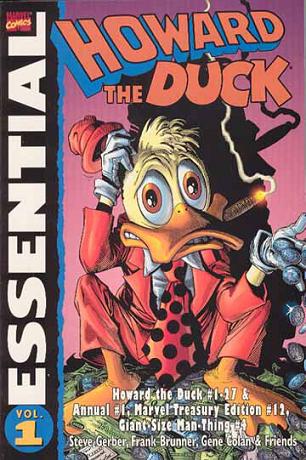
Essential Howard the Duck Vol. 01
Steve Gerber, Gene Colan and friends
Reprints: Howard the Duck #1-27, annual 1, Marvel Treasury #12 and more (January 1976 – September 1978)
Get this for: Gerber’s best work for Marvel — five stars
Get down America! Essential Howard the Duck Vol. 1 collects the complete original run of Steve Gerber’s Howard the Duck, the greatest cult hero of seventies Marvel, the one comic that captured the spirit of the seventies. Whether that still makes it interesting thirty years onwards is another question entirely. A question everybody needs to answer themselves, but for me I found these stories still surprisingly relevant and good.
As you probably know, Howard got his start with a cameo appearance in an early issue of Gerber’s Man-Thing, just one casualty in a reality war, taken from his own Earth and trapped in a world he never made. He was an instant hit, got two solo adventures in Giant-Size Man-Thing (no sniggering please), then his own series. Steve Gerber wrote all his appearances, including a teamup with The Defenders in Marvel Treasury Edition #12. The series took off, became a cult hit and more than that, one of the few real breakout titles Marvel had in the late seventies, popular enough to get a newspaper strip and much later a not very good movie. But that was after Gerber had left, as Marvel’s higher management fucked him over. All his writing on Howard was of course work for hire and hence continued by other hands after he quit, but none of it was any good. Howard the Duck only worked for Gerber, because he was Gerber.
It looks so easy, the Howard the Duck formula. Create some absurd villain, add a dash of parody, mix in a bit of social commentary and don’t forget the cynicism, add an ill humoured duck (or drake rather) and his girlfriend, then serve it all up with standard Marvel superhero soap opera plots. Yet only for Gerber would this work. Most other writers would just overdo the parody elements, making the Duck into a secondrate Mad imitator or got too absurd and Howard stopped to make sense. It’s the easiest trap to fall into as a writer, to think satire and humour are easy, that you can use a formula to produce it, that all it takes is some obvious parodies and some dime a dozen absurdity to make a Howard the Duck story.
It’s the same as with the old Batman television series, often imitated but never equalled by both other tv shows or comics, because none of those imitators ever got their heads round the idea that the secret was to treat Batman and his world seriously, that there are rules. In Howard’s case the menaces might be even more absurd but Howard still has to deal with them: a nine foot ginger bread man can still kill him if he doesn’t eat him first. Gerber wrote Howard the Duck exactly as he would a more “serious” superhero series and Howard’s villains like Space Turnip Man might be dumb or crazy, but they make sense in their own context. More importantly, Howard always is more than just a comic fowl (sorry), but a true tragic figure, a reverse Ben Grimm, a human trapped in a world of monstrous talking hairless apes.
What made Gerber’s Howard the Duck more than just the lazy parody his successors turned it into is that it was the story of his own struggle of living in seventies America. He can be incredibly blatant in this, (e.g. the Reverend Yucc and his Yuccies) and there is a lot of angst about politicians and Madison Avenue brainwashing and all that, but these are just the most obvious ways in which Gerber’s own emotions seep in the stories. The infamous issue sixteen, a fill-in issue needed because Gerber was blowing his deadlines, is the best example. Instead of the usual reprint or inventory issue, Gerber instead offers a stream of consciousness illustrated essay on his own hangups about Howard, a dialogue between the writer and his creation. It’s the highlight of the series.
Though Gerber was the driving force behind Howard the Duck Gene Colan should be mentioned as well. He portrayed all absurdities with the same ease as he would’ve illustrated a Daredevil or Tomb of Dracula story, without drawing undue attention to the wackiness. It doesn’t hurt that the man could draw either.
Howard the Duck was perhaps the best Marvel put out in the seventies. You need to have this volume.
Bruce Baugh
October 23, 2010 at 1:42 pmI re-read this last year, and was struck by how well I liked it all over again. I re-read these stories last in the ’90s, and then it seemed very flat and ridiculously titled in favor of all Gerber’s pet causes. These days, with the triumph of evil so well entrenched in so many ways, I like where his heart was at. And a lot of the humor worked absolutely as well as ever, for me.